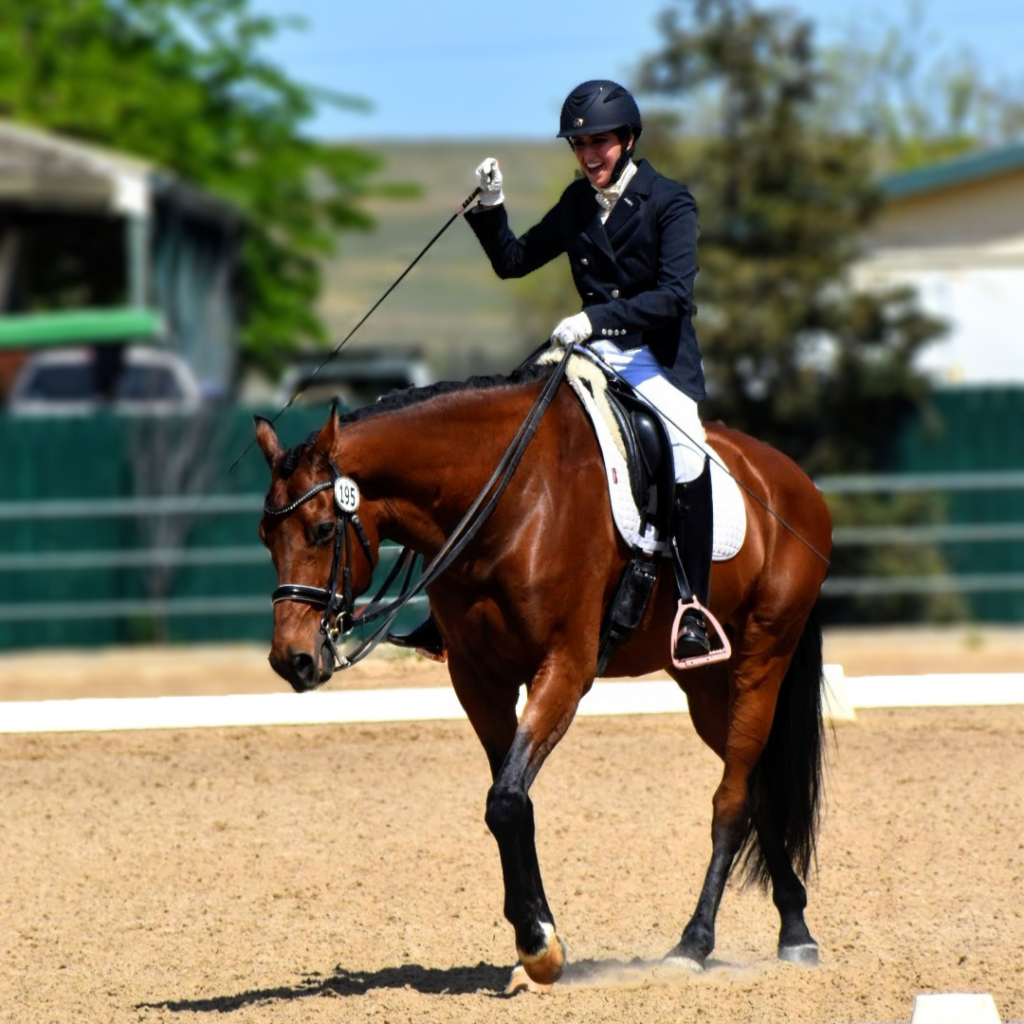
Mia is the Fall 2021 Dressage Dreamer Awardee, sponsored by Optimum Equine.
First generation American, daughter of a refugee, wheelchair user, advocate, assault survivor, unashamed. Mia Rodier-Dawallo is a Grade II, international Para Dressage competitor, a Persian-American, a survivor, and a rising star. She is ranked 3rd in the FEI World Individual Ranking in her grade for Team USA, and she is well on her way to making her dreams of Olympic proportions come true.
Although Mia, a lifelong rider, has made it to where she is today, she is insistent on giving thanks to her amazing community of family, friends, and teammates, (including those of the four-legged kind) at every step of the way. Her road to the Olympics has been a long one, paved with perseverance, overcoming obstacles, and exercising gratitude, patience, and perspective. In 2013, her life changed forever when she survived a brutal assault. Mia is very open about her mental and physical health and shares her experience with surviving assault saying, “People think that ‘surviving assault’ is just staying alive through being attacked, but the reality of the situation is that the real fighting for your life comes after. Fighting for your life after trauma comes in the form of living life through victim blaming; through coming to terms with your newly different and permanently disabled body; through learning to love yourself unconditionally; being patient with your brain while you struggle with brain fog, confusion, and fatigue; and being patient with your heart while you learn to manage the symptoms of your PTSD. This gave me a whole new perspective on life and gratitude. There were a few days where I wasn’t sure that I would live to see another day. But with a lot of work, I am thankful for every moment that I am alive. I am thankful not only that I have a future but that it has been made so bright by the people in my life. I have survived everything life has thrown at me to make it to exactly where I am meant to be, today.”
Outside of her Dressage career, she has been an avid advocate for the intersectional rights of marginalized people, women, people of color, the disability community, and low-income communities, amongst other causes. These causes are especially personal to her because she checks every box. As a child of an immigrant family, being a first generation American, Muslim and Baháʼí family, growing up in a post 9/11 world, life has been a slippery slope. She speaks, in length, about the triumphs and tribulations of what life is like for a young, brown girl, living in a country whose culture is so vastly different than that of the home she grew up in: to feel unseen, invisible, but still a threat. When you compound that with a stark lack of representation in popular culture and the public eye as a whole, we have a serious diversity problem on our hands. When you grow up to realize that most of the representation of the people who look, talk, and act like you consists of terrorists and “Apu”- type caricatures, it’s no wonder there are so many close-minded, preconceived notions. As Jen Richards said, “There is a one-word solution to media representation: more. Then, the occasional clumsy representation wouldn’t matter as much because it wouldn’t be all that there is.” We need more beautiful Black and brown faces in places that have been historically white; namely, the equestrian world.
This brings us to Dressage, and more specifically, Para Dressage. The “Para” in Para Dressage is short for parallel to signify equality between Dressage and Para Dressage. However, although Para Dressage athletes pour their blood, sweat, and tears into this passion, Para Dressage still seems to be an unknown sport altogether to a majority of the world, especially when compared to the mainstream international popularity of Dressage in general. It is hard to ignore the implication of implicit ableism that tinges the air in which the words “para” dare be uttered and dismissed. Mia goes on to state that, “with each layer of marginalization, it is almost like the world adds a weight to your back. This makes it so that you have to work twice as hard to get half as far as those who carry nothing on their back. This is the burden of POC, the burden of immigrants, the burden of the disabled, the burden of women, and the burden of those who don’t know where their next meal might come from.” This is very true of Para Dressage riders in general, but especially POC and low-income Para Dressage riders such as Mia. But what is the solution in a sport that is prohibitively expensive to many and invisible to even more? When there is no visibility, you are essentially training people to be unaware. Mia’s dreams and goals are to be the first ever person of color to compete in The Olympic and Paralympic Games in her sport. You heard that right, thus far, in this sport’s hundreds of years of history, there have been none. With just over a year until the World Equestrian Games in Denmark and a little over three years to go before the Olympic and Paralympic Games in Paris, she has big dreams and the talent to match. In steps Patty Mayer (Bailiwick House and Patty Mayer Dressage), Robyn Fisher (of R Farms Eventing and Dressage), Michel Assouline (Team USA Para Dressage Head Coach), Hope Hand (Paralympian and President of the United States Para Equestrian Association), and Laureen Johnson (Director of Para-Equestrian and Vaulting) to make those dreams come true.
As for Patty Mayer, she is the one who started it all. She has provided the training, networking, experience, and expertise to really catapult Mia’s career to full speed. Bailiwick House is where Mia began to form her string of champion horses provided by the syndicate of amazing women made up of Patty, her clients, and notably, Lynn Scheck. Those horses are Cato, a 14-year-old Bay Grand Prix Dutch Warmblood gelding; Kai, a chestnut six-year-old Dutch Warmblood stallion; and most ostentatious of all, Maddox, a 14-year-old Pinto Vanner with one blue eye and white feathers. Between the three of these promising horses, they possess more cunning, kindness, and determination of a whole herd, and then some!
Through Patty, Mia had the honor and pleasure of being introduced to Robyn Fisher. Robyn has given Mia the opportunity of a lifetime to ride and compete on Jayden, aka Pudding, a six-year-old KWPN gelding whose big heart and charm is matched only by his skill, passion, and promise. These are the horses that will be taking Mia on her Team USA journey and making dreams come true.
As for Assouline, Hand, and Johnson, they have completely revolutionized the sport via borrowed horse programs, networking, and programs that foster diversity and inclusivity. Recently, the USEF and FEI updated their rules to include more room for expressing yourself when it comes to protesting injustice and being vocal about social justice issues. Mia hopes these changes will make more room for open discussions on issues like race and privilege as well as creating a safe(r) space for Black and brown voices to be heard. Mia is well aware that discussions on inequality and disrupting the status quo can be uncomfortable after long periods of silence, but progress can feel uncomfortable, and that is a good sign. Mia quotes Robin DiAngelo, author of one of her favorite books “White Fragility: Why It’s So Hard for White People to Talk About Racism,” “For white people and systems who have just recently recognized their own complicity in America’s racist systems and are looking to ‘fix’ that, it’s not going to happen overnight. It’s a little bit like saying ‘I want to be in shape tomorrow.’ This is going to be a process.” In the wise words of Beyoncé, “It’s been said that racism is so American that when we protest racism, some assume we’re protesting America.” Wise words from wise women. Although there is still a lot of work to be done when it comes to diversity and inclusivity, Mia is confident that these recent shifts in policy and ideals are a wonderful change and a great start. This is what the face of progress looks like, and Mia is confident this is only the beginning.
It is easy to feel invisible when you don’t fit the mold, and it is even easier to feel erased when your sport, your struggle, and your generational trauma is invisible too. But Mia speaks fondly about words of wisdom she has received from her “Baba” through actions and the wise words of Rumi. Her favorite being, “تو با بال به دنیا آمدی. شما هرگز در زندگی نخواهید خزید.” “You were born with wings. You will never crawl through life.”
Even though she may have had to work twice as hard in life when compared to her more privileged peers, this has taught her to be a fighter. We have no doubt that she will excel at all of her goals and endeavors to come; continue to overcome each obstacle with grace; and be a role model for all young girls of color when we see her face in Denmark 2022/Paris 2024/LA 2028 representing her country amongst the best and brightest.
